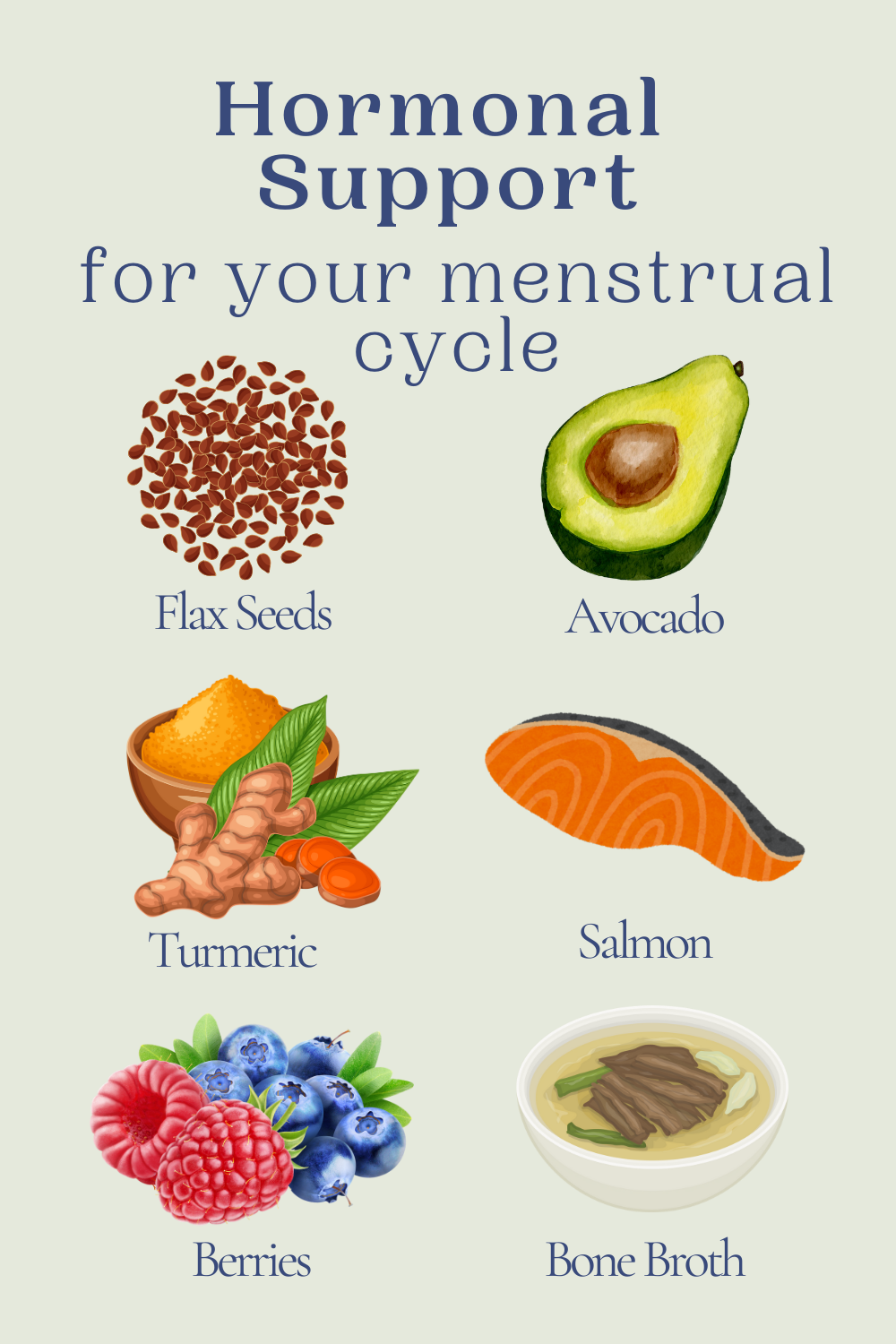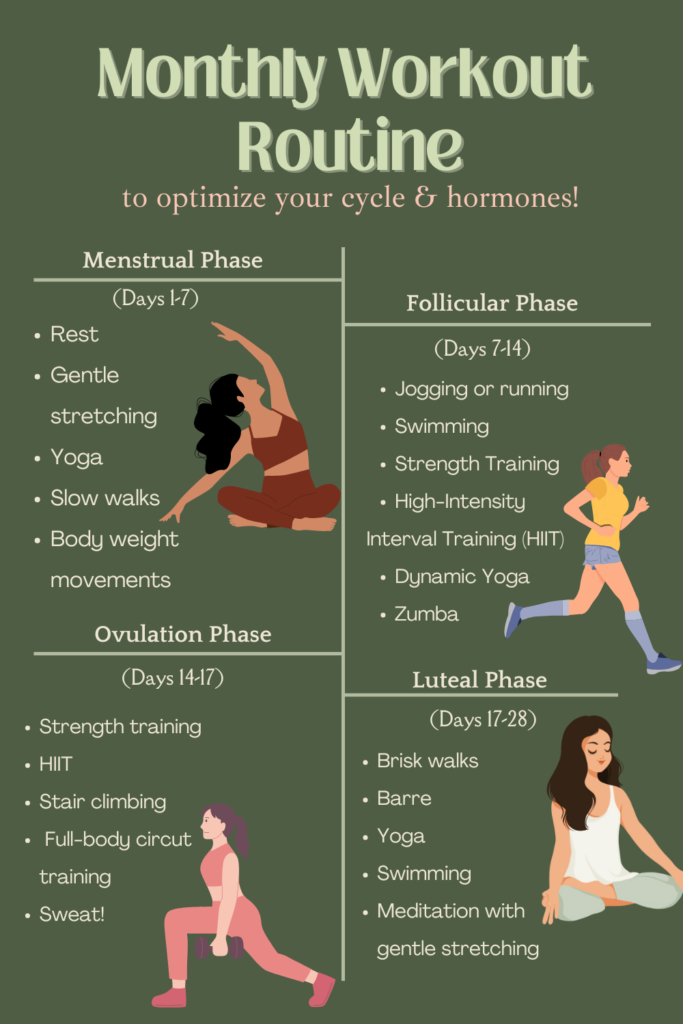
Knowing what hormonal foods to eat for women doesn’t have to be hard or complicated.
Navigating the intricate dance of the menstrual cycle requires more than just understanding the ebb and flow of hormones.
It involves nourishing the body with the right hormonal food for women that supports hormonal balance and overall well-being.
Each phase of the menstrual cycle demands unique nutritional needs, and embracing these needs can transform your experience of menstruation from a burden to a celebration of your cyclical nature.
Let us explore the profound world of hormonal food for women that can enhance your menstrual health and help you live in harmony with your body’s natural rhythms.
How to Balance your Hormones
The foundation of hormonal health lies in mindful eating, truthfully.
What goes in is what comes out, we all know this.
By choosing foods rich in specific nutrients, we can support our endocrine system, stabilize moods, and mitigate the symptoms associated with menstruation.
A diet that prioritizes whole foods, rich in fiber, healthy fats, and lean proteins, can work wonders in maintaining hormonal equilibrium.
This approach not only benefits the menstrual cycle but also promotes overall health and vitality. Because who doesn’t want to be, feel, and live strongly with support?
—————————————————————————————————————-
Optimize your monthly productivity while effectively managing your PMS.
This intentionally created guide-book was designed so you can confidently start understanding, tracking, and building connection with your body.
Inside you’ll find: scientific & holistic based evidence for tips, tricks, exercises, recipes, remedies, + more that support and amplify your cycle & well-being.
—————————————————————————————————————-
What food is good for female hormones?
Flax Seeds for Balanced Estrogen
Flax seeds are tiny powerhouses of nutrition, brimming with lignans and omega-3 fatty acids.
Lignans have estrogenic properties, which can help balance estrogen levels in the body.
These seeds are also high in fiber, aiding digestion and detoxification processes.
Sprinkle them on your morning yogurt or blend them into smoothies to harness their hormone-balancing magic.
Avocado for Hormone Production
Avocado, often hailed as a superfood, is rich in healthy monounsaturated fats, which are essential for hormone production.
It also contains beta-sitosterol, a compound that helps manage cortisol levels, the body’s primary stress hormone.
Avocado’s creamy texture and mild flavor make it a versatile addition to salads, toast, and even desserts.
Turmeric for Anti-Inflammatory Properties
Turmeric, with its vibrant golden hue, is a potent anti-inflammatory and antioxidant.
The active compound curcumin in turmeric aids in reducing inflammation and can alleviate menstrual pain.
Turmeric also supports liver function, which is crucial for hormone metabolism.
Add turmeric to curries, soups, or enjoy it as a soothing golden milk.
Salmon for Reducing Hormonal Inflammation
Salmon is an excellent source of omega-3 fatty acids, which are crucial for reducing inflammation and supporting brain health.
These fatty acids also play a significant role in balancing hormones. Rich in vitamin D and selenium, salmon supports thyroid function and mood regulation.
Grilled, baked, or smoked, salmon is a delicious way to boost your hormonal health.
Berries for Vitamins and Fiber
Berries are packed with antioxidants, vitamins, and fiber. They help combat oxidative stress, which can disrupt hormone balance.
Berries also support liver function and aid in the detoxification of excess hormones.
Enjoy a handful of blueberries, strawberries, or raspberries as a snack or add them to your breakfast bowl.
Bone Broth for Collagen and Calcium
Bone broth is a nutritional elixir rich in collagen, gelatin, and essential amino acids.
It supports gut health, which is intrinsically linked to hormone regulation. Bone broth also contains minerals like magnesium and calcium that aid in reducing menstrual cramps and supporting bone health.
Sip on warm bone broth or use it as a base for soups and stews.
Dark Leafy Greens for Magnesium
Dark leafy greens like spinach, kale, and Swiss chard are nutrient-dense and high in magnesium, which helps alleviate menstrual cramps.
They are also rich in iron, essential for replenishing blood loss during menstruation.
Incorporate these greens into your meals through salads, smoothies, or sautés to nourish your body deeply.
Eggs for Essential Amino Acids
Eggs are a complete protein source, providing all nine essential amino acids.
They are also rich in choline, which supports brain health and hormone production.
Eggs contain healthy fats and vitamins like D and B12, which are crucial for overall hormonal balance.
Enjoy them boiled, scrambled, or as an omelet to start your day right.
Nuts and Seeds for Healthy Fats
Nuts and seeds like almonds, walnuts, and chia seeds are excellent sources of healthy fats, protein, and fiber.
They contain phytoestrogens that help balance estrogen levels and magnesium, which alleviates PMS symptoms.
Snack on a handful of nuts or sprinkle seeds on your salads and yogurt for a nutritious boost.
Fermented Foods for Probiotics
Fermented foods such as yogurt, kefir, sauerkraut, and kimchi are rich in probiotics that support gut health.
A healthy gut is essential for hormone metabolism and detoxification. These foods also enhance immune function and nutrient absorption, contributing to overall hormonal harmony.
Include a serving of fermented foods in your daily diet for optimal health.
Tips for Nourishing Your Hormones with Food
1. Honor Your Body’s Rhythms
After all, you are a cyclical human.
We ebb and flow while having intense cravings sometimes.
By remembering to nourish foods that support these changes, we can let each meal be another act of self-love and reverence for our body’s wisdom.
It’s all about tuning into your body’s cycle and listening to its needs.
2. Create a Mindful Ritual Around Eating
Taking a mindful approach to eating can not only enhance your digestion but nurture your emotional and mental self.
Like saying a prayer or affirmations, you can light a candle, play soothing music and take time to savor each bite when eating.
We often can stuff ourselves with food unknowingly because we are not present, or just starving so slowly down for mindful bites can be transformative.
3. Choose Foods That Bring Joy
It’s important to actually feel good eating the food you choose.
Try selecting foods that support hormonal health and that you know you will actually eat.
Get to know the vibrant colors of fresh produce, the comforting warmth of homemade meal and rich flavor profiles of nutrient dense foods.
I recently re-visited eating plain dates and wow, they were mouth watering delicious.
4. Practice Gratitude for Nourishment
This gratitude can enhance your emotional relationship with food and promote a positive mindset.
Gratitude is so life-changing as by itself, but can nurture your emotional relationship with food that cultivates a positive mindset.
Before each meal, just take a moment to appreciate the journey of food from nature to your plate.
I bet you will feel a difference with your relationship with food after implementing this regularly!
5. Accessing Raw, Unrefined Foods
Foods that are closest to their natural state are not only more beneficial for hormonal balance but also connect you with the body we live on: earth.
Fresh fruits, vegetables, nuts, and seeds are some of the staples to a healthy diet
I encourage you to let these natural foods remind you of your own innate strength and resilience.
Remember, Food is Fuel for your Body
A diet rich in hormonal support foods can profoundly impact your menstrual health, your body image, your sleep, energy levels, and a ton of other amazing benefits.
By nourishing your body with the right nutrients, you can create a harmonious balance within your endocrine system and alleviate menstrual symptoms while boosting your energy levels.
Your menstrual cycle should not a burden, but a reminder of a beautiful expression of your cyclical nature.
Mindful eating takes time, and so does getting to know the natural rhythm of your body.

